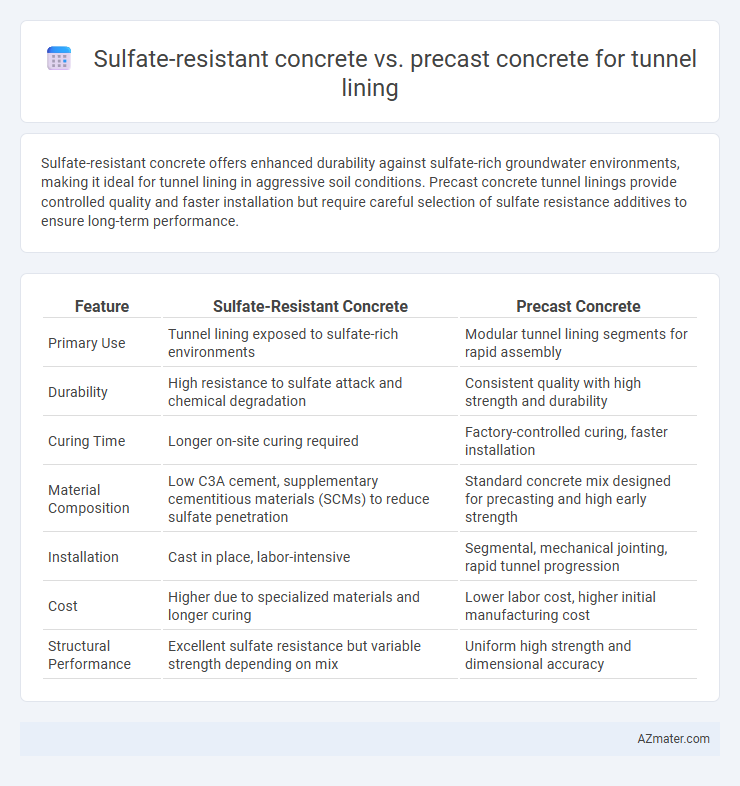Sulfate-resistant concrete offers enhanced durability against sulfate-rich groundwater environments, making it ideal for tunnel lining in aggressive soil conditions. Precast concrete tunnel linings provide controlled quality and faster installation but require careful selection of sulfate resistance additives to ensure long-term performance.
Table of Comparison
| Feature | Sulfate-Resistant Concrete | Precast Concrete |
|---|---|---|
| Primary Use | Tunnel lining exposed to sulfate-rich environments | Modular tunnel lining segments for rapid assembly |
| Durability | High resistance to sulfate attack and chemical degradation | Consistent quality with high strength and durability |
| Curing Time | Longer on-site curing required | Factory-controlled curing, faster installation |
| Material Composition | Low C3A cement, supplementary cementitious materials (SCMs) to reduce sulfate penetration | Standard concrete mix designed for precasting and high early strength |
| Installation | Cast in place, labor-intensive | Segmental, mechanical jointing, rapid tunnel progression |
| Cost | Higher due to specialized materials and longer curing | Lower labor cost, higher initial manufacturing cost |
| Structural Performance | Excellent sulfate resistance but variable strength depending on mix | Uniform high strength and dimensional accuracy |
Introduction to Tunnel Lining Materials
Tunnel lining materials are critical for ensuring structural integrity and durability, especially in harsh environments. Sulfate-resistant concrete is specially formulated to withstand chemical attacks from sulfates commonly found in soil and groundwater, reducing degradation risks in tunnel linings. Precast concrete offers controlled manufacturing conditions that enhance quality and uniformity, enabling faster installation and consistent performance in tunnel construction.
Overview of Sulfate-Resistant Concrete
Sulfate-resistant concrete is specifically formulated to withstand aggressive sulfate environments commonly found in underground tunnel conditions, using low C3A cement and supplementary cementitious materials like fly ash or slag. This concrete type significantly reduces the risk of sulfate attack, which can cause expansion, cracking, and deterioration in tunnel linings. Compared to standard precast concrete, sulfate-resistant concrete ensures enhanced durability and longevity in sulfate-rich soils and groundwater, critical for maintaining structural integrity in tunnel lining applications.
Precast Concrete: Definition and Applications
Precast concrete for tunnel lining involves factory-cast segments designed for quick assembly underground, providing enhanced quality control and durability. It offers high compressive strength, dimensional accuracy, and efficient installation, making it ideal for long tunnel projects requiring consistent performance. Its applications span metro rail tunnels, highway underpasses, and water conveyance systems, where rapid construction and structural integrity are critical.
Chemical Resistance in Tunnel Environments
Sulfate-resistant concrete is specifically formulated with low C3A cement content and supplementary cementitious materials to enhance chemical resistance against aggressive sulfate ions commonly found in tunnel environments. Precast concrete for tunnel lining can incorporate sulfate-resistant mixes, but its chemical durability depends on the manufacturing process and material composition, offering consistent quality control. In highly aggressive sulfate-rich groundwater conditions, sulfate-resistant concrete provides superior longevity and reduced degradation compared to conventional precast concrete formulations.
Strength and Durability Comparison
Sulfate-resistant concrete offers enhanced durability in aggressive sulfate environments commonly encountered in tunnel lining, significantly reducing the risk of chemical attack and structural degradation. Precast concrete provides uniform strength and controlled curing conditions, resulting in high compressive strength and consistent quality for tunnel segments. Comparing the two, sulfate-resistant concrete excels in resisting chemical attacks to maintain long-term durability, while precast concrete ensures superior mechanical strength and dimensional accuracy for efficient tunnel lining installation.
Installation and Construction Time
Sulfate-resistant concrete offers enhanced durability in aggressive soil environments, reducing maintenance needs but often requires longer curing times that can delay tunnel lining installation. Precast concrete segments enable faster construction due to factory-controlled conditions and quick on-site assembly, significantly shortening installation timelines. Combining sulfate resistance with precast technology can optimize tunnel lining performance while minimizing construction time.
Cost Analysis of Both Solutions
Sulfate-resistant concrete typically incurs higher initial costs due to specialized cement and additives designed to withstand aggressive sulfate environments, increasing material expenses by 15-25% compared to standard mixes. Precast concrete for tunnel linings involves upfront manufacturing and transportation costs but offers savings in construction time and labor, reducing overall project expenses by approximately 10-20%. Lifecycle cost analysis shows sulfate-resistant concrete may require less maintenance in sulfate-rich soils, balancing higher initial investments against long-term durability, whereas precast concrete provides cost efficiency through controlled production and faster installation cycles.
Maintenance and Lifespan Considerations
Sulfate-resistant concrete provides enhanced durability and significantly reduces maintenance requirements in tunnel linings exposed to aggressive sulfate-rich environments, extending lifespan beyond 50 years. Precast concrete offers precise quality control and faster installation but may require joint sealing and periodic inspection to prevent water ingress, impacting long-term maintenance schedules. Selecting sulfate-resistant concrete is critical for minimizing degradation and ensuring structural integrity under harsh chemical conditions over extended service periods.
Suitability for Various Soil and Water Conditions
Sulfate-resistant concrete is specifically engineered to withstand high sulfate concentrations in soil and groundwater, making it highly suitable for tunnel linings in aggressive environments with sulfate-rich soils or brackish water. Precast concrete offers controlled quality and durability but may require additional protective measures or specialized mix designs when exposed to high sulfate levels. Choosing between sulfate-resistant and precast concrete depends on the soil sulfate content, groundwater chemistry, and project-specific environmental challenges to ensure long-term tunnel lining performance.
Selecting the Optimal Concrete Type for Tunnel Projects
Sulfate-resistant concrete is engineered to withstand aggressive sulfate environments commonly found in underground tunnels, preventing concrete deterioration and extending tunnel lifespan. Precast concrete offers controlled quality, faster installation, and improved dimensional accuracy, crucial for meeting tight tunnel construction schedules and complex designs. Selecting the optimal concrete type hinges on environmental conditions, project timeline, and structural requirements, with sulfate-resistant concrete favored for harsh chemical exposure and precast concrete preferred for precision and speed.

Infographic: Sulfate-resistant concrete vs Precast concrete for Tunnel lining
 azmater.com
azmater.com